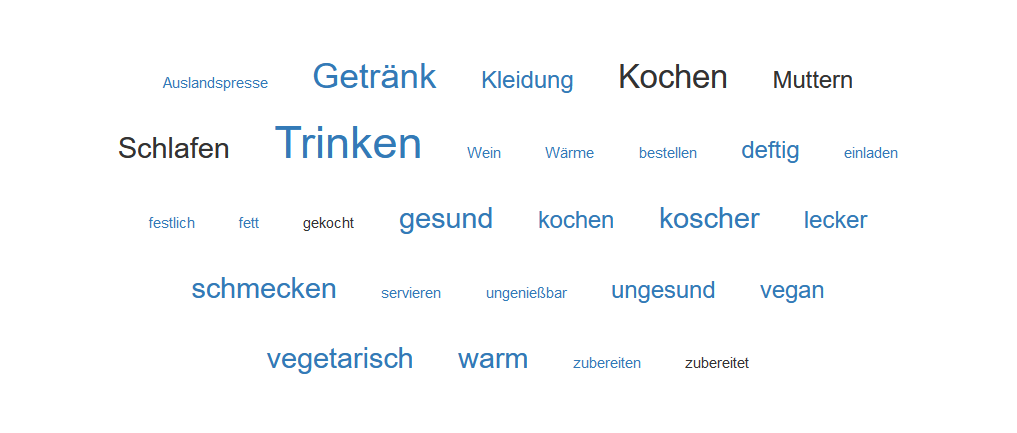Vocabulary Module 2: Essen
In this module, you will learn some vocabulary to talk about food (Essen) using Das Digitale Wörterbuch der Deutschen Sprache (DWDS), a large electronic collection of German texts known as a corpus. Let’s explore what words German speakers use to talk about food. Go to the DWDS homepage and type Essen in the search box. Don’t forget to capitalize the word Essen! (If you don’t capitalize it, you will get results for the verb essen, ‘to eat’). You will be taken to a page that gives you a lot of information about this word, but we will focus on the word cloud, which is available in the Typische Verbindungen section.

The word cloud above shows the words that commonly occur with the word Essen; such words are known as collocates. The larger the word in the image is, the more often it co-occurs with Essen. You can also see a numerical representation of the frequency of co-occurrence by looking at the Überblick table for Essen accessible through the Detailliertere Informationen link above the word cloud.
Activity 1
Now, let’s review the meaning of German adjectives and verbs from this word cloud by matching them with their English equivalents. If needed, you can consult the online dictionary LEO.
Activity 2
A.
Let’s learn more collocates of Essen. Click the Detailliertere Informationen link above the word cloud for Essen and scroll down to the table hat Präpositionalgruppe. Which three of the prepositional phrases below describe places where you can eat?
B.
Now read the DWDS sentence examples below. Can you guess the difference between the three places where you can eat?
- Firmen verwöhnen ihre Mitarbeiter mit Gruppenreisen, Tenniskursen und gesundem Essen in der Kantine.
Die Zeit, 05.01.2017, Nr. 01 - Netter Chef, nette Kollegen, gutes Gehalt, kostenloses Essen in der Kantine.
Bachner Frank: Drei Leben. Der Tagesspiegel, 15.04.2018 - Außerdem gefällt mir an meiner Schule, dass das Essen in unserer Mensa ziemlich gut ist.
Der Tagesspiegel, 11.09.2018 - Das Essen in den Frankfurter Mensen gilt bei Studierenden ohnehin nicht als billig.
Ärger über teure Mensa. Frankfurter Rundschau, 26.04.2014 - Wegen der Corona-Krise ist Essen im Restaurant lange nicht möglich gewesen – doch das ändert sich jetzt schrittweise in den Bundesländern.
Warum wir gerne in Restaurants gehen. Neue Osnabrücker Zeitung, 13.05.2020 - Die Bewohner schauen beim Essen im Restaurant direkt über den Bodensee, bei gutem Wetter strahlen selbst die Alpen im Sonnenschein.
Wenn der Urlaubsort zum Alterswohnsitz wird. Neue Osnabrücker Zeitung, 18.01.2020
You can see more usage examples by clicking on each prepositional phrase in the table hat Präpositionalgruppe.
Activity 3
Now let’s find out more about the use of kochen, a collocate of Essen. Click on kochen in the word cloud for Essen or search for it from the DWDS main page. Then, go to its Typische Verbindungen section (word cloud).
A.
Divide the following nouns that are frequently used with kochen into two different categories according to their meaning.
B.
Here are some example sentences with the expression Kaffee kochen:
- Er kocht Kaffee und Tee, bietet an, Eier zu braten.
Die Zeit, 25.03.2013, Nr. 12 - Ich gehe auf mein Zimmer und koche mir einen ordentlichen türkischen Kaffee.
Die Zeit, 13.08.2012, Nr. 33 - Indem sie der Software, zum Beispiel über eine App, sagen, dass sie jetzt Kaffee kochen und ihr später mitteilen, wann er fertig ist.
Die Zeit, 26.05.2017 (online)
What is the closest English meaning for Kaffee kochen?
Activity 4
Now let’s find out more about the use of schmecken, another collocate of Essen. Click on schmecken in the word cloud for Essen or search for it from the DWDS main page. Then, go to its Typische Verbindungen section (word cloud).
Among the adjectives that are frequently used with schmecken, which two describe an unpleasant taste?
Activity 5
Click on the word bitter in the word cloud for schmecken and then scroll down to its word cloud.
A.
Among the words that are frequently used with bitter, which one is used with bitter in its literal meaning?
Here are some DWDS example sentences:
- Bittere Medizin schluckt man am besten schnell!
Die Zeit, 04.02.2013, Nr. 05 - Doch noch mehr bittere Pillen haben wir Deutschen nicht verdient.
Die Zeit, 15.03.2006, Nr. 11 - Für ihren Patriotismus, das ist die bittere Ironie, hat die SPD stets bezahlt.
Die Zeit, 05.12.2011, Nr. 49 - Er kennt den Geschmack des süßen Sieges ebenso wie den der bitteren Niederlage.
Die Zeit, 31.05.2011 (online) - Das ist eine bittere politische Wahrheit, aber so ist es nun mal.
Die Zeit, 07.01.2013, Nr. 01 - Allein in der Ukraine kostete die bittere Kälte mindestens 135 Menschen das Leben.
Die Zeit, 06.02.2012 (online) - Für den englischen Fußball-Meister Manchester United hat das neue Jahr mit einer weiteren bitteren Enttäuschung begonnen.
Die Zeit, 04.01.2012 (online) - Durch das späte Gegentor hatte der süße Sieg für Barcelona einen bitteren Beigeschmack.
Die Zeit, 24.08.2012 (online)
B.
What is the best translation for the following German saying?
Eine gute Medizin schmeckt dem Gaumen bitter.
Activity 6
On your own. Explore the usage of a few other adjectives by clicking on them in the word cloud for Essen and exploring their word clouds!
Activity 7
On your own. Using 3-5 adjectives and 3-5 nouns from this module, write three sentences describing what you like to eat and your favorite place to eat. Please pay attention to which nouns and adjectives frequently go together! If you want, you may add an idiomatic expression that you learned.
For example:
Ich esse gern gesundes Essen.
Mein Lieblingsrestaurant ist Panera Bread.
Ich esse nicht gern Fisch.
Here you can read more about German food habits: GermanFoods.
Schirin Kourehpaz & Nina Vyatkina

